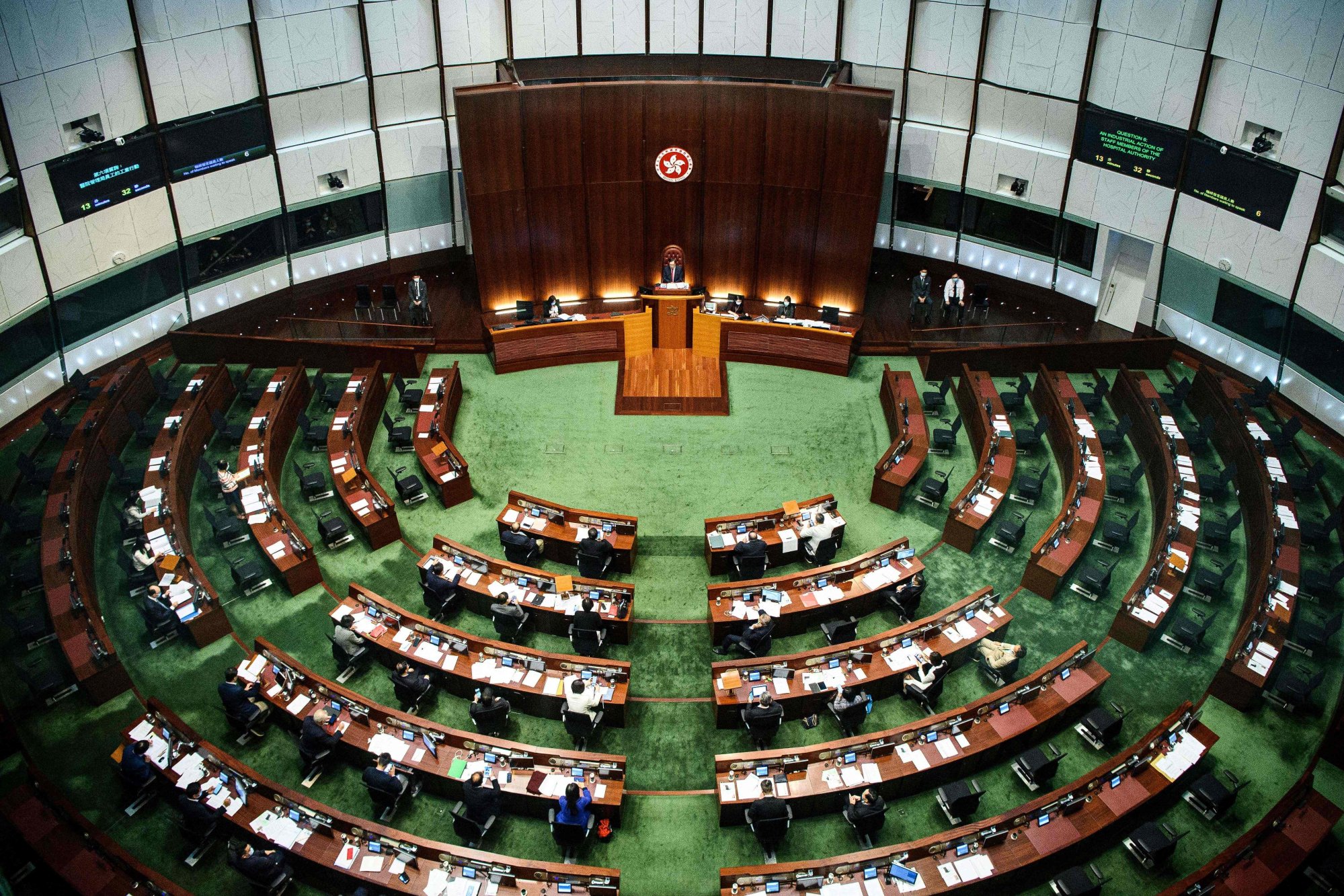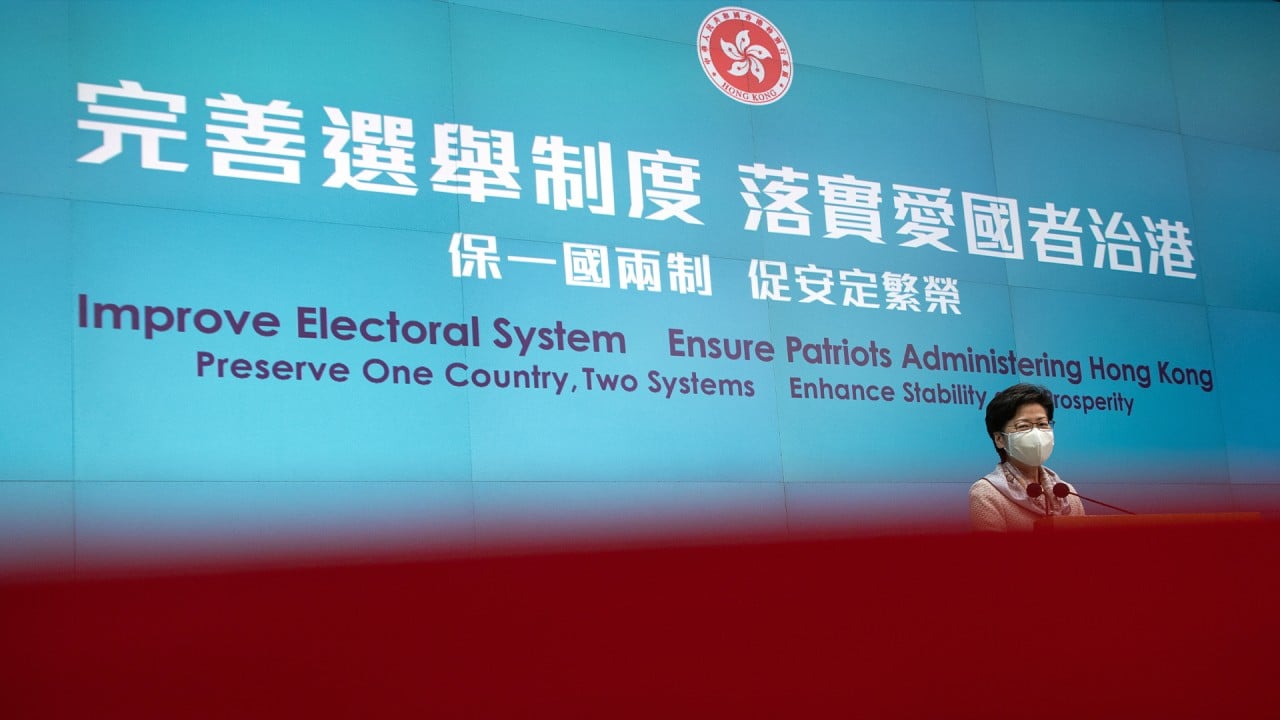
First national security law, then electoral overhaul and now, more rules to keep Hong Kong politicians on a tight leash
- A redrawing of geographical boundaries to further weaken any advantage the opposition could have is on the cards
- Criminalising any advocacy for voters to cast blank ballots will be among the other moves, sources reveal
Hong Kong officials will seek to leave nothing to chance by laying out on Tuesday a “watertight” set of amendments to local laws to implement a Beijing-led overhaul of the city’s electoral system, sources told the Post.
A redrawing of geographical boundaries to further weaken any advantage the opposition could have is on the cards. Among other moves would be to criminalise any advocacy for voters to cast blank ballots, other sources revealed, ahead of the unveiling of at least 20 ordinance and subsidiary legislative amendments running into hundreds of pages of bills.
While the sources were tight-lipped, it would appear the two changes on boundaries and blank votes were among the key moves being debated within the ruling establishment.
In the last elections, the 35 seats were split into five geographical constituencies but these will now be redrawn into 10 constituencies. Voters in each of these constituencies will elect the top two candidates.
Can blank ballots be banned in Hong Kong polls, and what now for voter turnout?
Scholars and politicians, however, argued that the change from proportional representation in the five constituencies to “one vote, two seats” over 10 constituencies might not in reality give the pro-establishment camp the upper hand, provided there were enough opposition candidates allowed into the ring to contest. Right now, all candidates must get nominations and be cleared by a vetting committee before they can officially throw their hat into the ring.
On the move to outlaw blank ballots, a government source confirmed there would be amendments to the current Elections (Corrupt and Illegal Conduct) Ordinance, to specifically state that encouraging the public to cast protest votes could be seen as “manipulating elections” and would be deemed a criminal act.
“The government currently has no plan to restrict individual voters to cast blank votes or spoil ballots as a sign of protest,” the source added. “Only those who advocate such an idea would be punished.”
Shake-up of constituencies but to whose advantage?
When Beijing last month drastically revamped the city’s electoral system, it expanded Legco from 70 to 90 seats but skewed the odds in favour of the pro-establishment camp securing a greater presence. Some 40 lawmakers will now come from the powerful Election Committee while another 30 will be from the functional constituencies and the remaining 20 will be directly elected seats according to geographical districts.
The proportional representation mechanism which had been adopted since the city’s handover to Chinese rule in 1997 will also be ditched, as the geographical constituencies now consist only of 10 districts to be won, as it were, by first-two-past-the-post: the top two candidates with the highest votes.
Ex-leader CY Leung undecided on running for Hong Kong chief executive
All candidates will also have to be approved by an influential vetting committee, which will be created to make sure election hopefuls pose no threat to national security.
The proposed bill – which consists of amendments to five key ordinances and other related subsidiary laws – will fill in all the remaining gaps left untouched by Beijing. That will include the redefinition of voter and candidate criteria in some functional constituencies in the legislature, the line-up and duties of the new vetting committee as well as the consequences of “election manipulation”.
Apart from the reduction in the number of lawmakers, the geographic constituencies will face a major shake-up, the Post has learned from various sources.

Under the new arrangement, Hong Kong Island, which used to have six seats, will be divided into two constituencies: Island East and West. The outlying islands, originally included in the New Territories West constituency, will be moved to Island West. This could potentially help the pro-establishment bloc as it is traditionally not strong on Hong Kong Island’s western areas.
A new Kowloon Central constituency will be created on top of the existing Kowloon East and West, which used to return 11 seats. The three Kowloon electorates will return six seats.
The New Territories, originally split into East and West and each carrying nine seats, would be regrouped into five constituencies: North and Yuen Long; part of Tuen Mun and Tin Shui Wai; Tsuen Wan, Kwai Tsing and the other part of Tuen Mun; Sai Kung and Ma On Shan; as well as Sha Tin and Tai Po. They will bring a total of 10 seats.
Political scientist Dr Ma Ngok, of Chinese University, pointed out the pro-establishment bloc might enjoy an advantage in the new North and Yuen Long constituency, which would cover an extensive rural area dominated by traditionally conservative villagers.
If a lot of pan-democrats are screened out from the polls, probably not many will be interested in casting their ballots
But he said the redrawing of boundaries would not be the decisive factor in determining the fate of the opposition, as the camp was already hobbled even before the race could begin.
“The crux is who can stand in the elections,” he said. “If a lot of pan-democrats are screened out from the polls, probably not many will be interested in casting their ballots.”
Ma said though that if the opposition did get to throw its hat into the ring in sufficient numbers, it would be highly unlikely for either camp to win both seats in a constituency under the “one vote, two seats” mechanism.
Before the electoral changes, the old proportional representation system meant more seats would be up for grabs in a broader swathe of one constituency, allowing the opposition to milk its advantage in that area to the maximum.
So for example, in the 2016 elections, the opposition targeted its stronghold of New Territories East. It managed to pocket six of the nine seats in the area, banking on support for localists who ran very constituency-specific campaigns, such as being against congestion caused by traders crossing the border.
In New Territories West, the opposition took four out of the nine seats. But that was mainly due to their less sophisticated effort in coordination. Former opposition lawmaker Eddie Chu Hoi-dick bagged more than 84,000 votes in the constituency, when Beijing-loyalist Junius Ho Kwan-yiu managed to win a place marginally with merely 35,657. The camp, which enjoys the advantage in direct elections, could have secured more seats should they have evenly split the votes among themselves.
In total, it scored 10 of the 18 seats in the New Territories – or 56 per cent.
But under the redrawing based on the electoral overhaul, the whole of the New Territories will be dissected into five smaller electorates, each returning two seats.

Two realities await the opposition camp, even if it did manage to get through enough candidates to secure nominations – a minimum of 10 such endorsements spread across the entire Election Committee which will give or withhold its blessings – and get past the screening process.
First, it does not have the resources to put up more than one candidate per constituency, at least not in its current beleaguered state where many of its stars are either facing prosecution or are in detention under the national security law.
Second, it has to contend with the prevailing split of voters, of 55 per cent typically going for the opposition and 45 per cent for the pro-establishment camp. No matter how hard it tries, under the top two candidates win scenario, it is unlikely that it can amass enough extra support to win the second seat, unlike in the proportional representation system.
So in theory, their maximum chance would be to secure half of the 20 seats up for grabs or one seat in each geographical constituency.
Shoo-in for pro-establishment camp? Not so fast
Arguably, the pro-establishment bloc with better resources could send more than one candidate to a district but there still remained a risk of defeat for as long as there was a rival opposition candidate, analysts said.
“Would the pro-establishment bloc be confident that the two lists they fielded can split the votes so evenly that it allows them to beat their opponents and take both seats?” Ma asked. “They probably would prefer not to take that risk and instead opt for better coordination among their camp to avoid clashes.”
A pro-establishment lawmaker agreed the camp would probably coordinate between parties so that only one person, or at most two candidates, would run in each constituency, “to maximise the seats they could get”.
“Based on internal communication and discussions, we can avoid letting the pan-democracy camp get more than half of the seats, while we also do not have to devote or put so much energy into the direct election campaign,” the veteran, who preferred to stay anonymous, told the Post.
This will be completely different from the past, in which various political parties would send their lists of candidates to compete against each other, even when they were in the same political camp.

“Under the new electoral system, maybe some non-patriots will be shut out and there could be more [Legco] seats available [to grab] for the pro-establishment camp. But competition will not be reduced,” Leung said on an online show.
“In the past [the pro-establishment side] competed mainly with the opposition camp. But now, competition with the opposition might be reduced but competition with fellow pro-establishment parties or candidates might increase.”
Democratic Party chairman Lo Kin-hei also said redrawing of the boundaries would have little impact on the already battered opposition.
“Our camp would at most win 10 seats in the geographical constituencies no matter how the boundaries are drawn. And that has not even taken into account how many of us can actually enter the race,” he said. “It has become meaningless.”
Turning to the issue of criminalising the encouragement of voters to cast blank ballots, analysts said implementation and enforcement might be difficult, especially if the campaign was couched in a vague manner or surreptitiously.
Professor Albert Chen Hung-yee, a member of the Basic Law Committee, said under the existing legislation, it was not unlawful not to vote or to cast a blank vote, and advocating such behaviour was not a criminal offence. He said this legal position should be maintained and it was in Hong Kong’s best interests to refrain from criminalising calls for blank votes.
Electoral overhaul could lead to universal suffrage, says CY Leung
Lo also said the plan to criminalise acts of advocating a blank vote movement did not make sense. “I don’t see what is the point of it,” he said.
He was only echoing the prevailing sentiment of dejection in the opposition camp, as it contemplated whether it still had a future in Hong Kong politics. Many said they would just wait for the final details of the law before determining if they would try to contest or boycott the polls.
On the other side, the establishment camp was hoping for a swift passage of the bills, arguing that these were just details, as the pieces on the checkerboard had already been rearranged.
“The government hopes these bills can pass as soon as possible, while it will start preparing for the coming three elections,” the source said. “Most of these amendments should not really be controversial given the central government has laid down the framework already.”
Additional reporting by Ng Kang-chung




